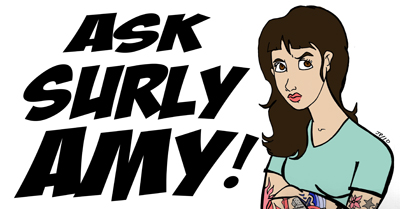Ask Surly Amy: Homeopathy

Dear Surly Amy,
I am a college student lucky enough to have a roommate whom I love dearly. She's a wonderful friend and a very intelligent person. The only problem is that she's very into homeopathy. She grew up with it, because her mother (who is a scientist, strangely, although I know not what sort) also believes in it. She's been using homeopathic remedies even more since having issues with her neck muscles and developing horrible migraines, and it makes me uncomfortable seeing her waste money on snake oil. How do I respectfully but effectively talk to her about the fact that homeopathy doesn't work? I've tried to bring up the subject before but she immediately deflected the argument onto touchy-feely reasoning about how her mom believes in it and it gives her comfort. That's all well and good, but she's wasting her money! How do I try to get her to understand?
~Miranda
Dear Miranda,
The best way to explain how innefective homeopathy is, is to simply explain how it is supposed to actually work.
First a bit of history.
Homeopathy was invented in the 19th century by Samuel Hahnemann. Hahnemann was a dude with good intentions. He lived in a time when bloodletting was the primary course of action to attempt to “cure” disease. Yeah, they (the doctors of the day) would cut you open or apply leeches and literally bleed you out in an attempt to force disease out of your body. You know those candy stripes on old barbershop signs? Barbers had sharp knives and were some of the original blood-letters. They were the precursor of modern day surgeons. The red and white signs were meant as representations of blood soaked bandages on a pole. To say that this unsanitary and rather horrific treatment was ineffective would be an understatement. Many died unnecessarily. In fact, so many people died from bloodletting that your odds of surviving a disease were increased if you did not go to a doctor (or a barber) at all.
So in comes Hahnemann. He wanted to come up with a better way to help people. Bleeding people was the treatment of the day and Hahnemann and the majority of other physicians of the time did not employ the scientific method so the bar was set very, very, very low. Hahnemann was correct about the need for more humane treatments and the inefficacy of bloodletting. He came from an honorable starting point. However, his intent was probably the last thing he was ever correct about in terms of effective medical treatments.
So much for good intentions and off we go down the rabbit hole.
Homeopathy comes from the words homeo (similar) and pathos (suffering). Hahnemann came up with a hypothesis that like cures like. For example, if you have trouble sleeping then the cure should be caffeine. I will let that sink in for a moment.

Yep, coffee or another stimulant, I dunno, maybe a tiny bit of cocaine, should be just what you need to get some rest. Sound logical? No. Of course it doesn’t. But Samuel believed that if a substance could cause the symptoms of a disease it, in small doses could in turn treat the disease. In his mind he believed that everything was about balance and harmony and the idea that like-cures-like. Ah, sounds romantic doesn’t it? He also believed in a “vital force” that does not exist that healed the body and that miasms, (oh sounds scary) were responsible for most illness. He, in regular-English-terms believed that most disease originated through the skin and that the first sign of illness is always a skin disorder. O_o He thought that if something caused the symptom of illness then the essence of it would help the imagined vital force cure the physical body. He believed in a lot of incorrect things. But hey! He wasn’t cutting people open at the barbershop! So there is that!
What about doses? What is in this stuff and can it work?
So if we follow Hahnemann’s logic… (Wow, that hurt to type.) … we would wonder… well, if you want to treat someone who is vomiting and you give them something that makes them vomit like a bit of poison wouldn’t they vomit more and die? Well, YES but that is why Hahnemann said you have to dilute and shake. In homeopathic terms: Dynamization! Dynamization is a spiritual release. Sounds sexier than it is! Yep, shake to dynamize the spirit and dilute and repeat (sucussion) until only the essence of the poison or caffeine or whatever substance you wish to use remains in either the water or alcohol base used to dilute. Here is a video by Ben Goldacre that shows how dilute a substance must be in order to be homeopathic. He also explains how you test homeopathy, talks about the placebo effect and says “orange cordial” a few times. Enjoy!
In conclusion.
As time went on germ theory was introduced and western medicine began to adopt a science-based view of medicine. People tested things. People looked for evidence. Homeopathy was tested and tested again. Its effects have been shown again and again and are only that of a placebo. Collectively, we know that these energy force and you-have-to-believe-it-to-be-true types of treatments do not work. But for some reason homeopathy has held onto the imaginations and hope of many. It simply can’t work. There is no mechanism for it to do so. It is a faith-based treatment and while it often does little harm, it does much less to help and sometimes steals valuable time and money that could be better spent on proven treatments. Homeopathy as a word sounds like “home remedy.” It sounds and often is harmless. In theory, while better than bloodletting it is no better than and is technically nothing at all. If created the way it was intended. Homeopathy is nothing more than a sugar pill.
One other note before I run off to make an Orange Cordial. Traditional homeopathic remedies if prepared to homeopathic standards actually have no active ingredients and therefore can have no actual effect beyond placebo and since manufacturers know this, many have begun adding actual measurable ingredients to the mix while still labeling the product as homeopathic. Homeopathy is considered part of the supplement market and so is widely unregulated. So buyers beware. What you think may be a sugar-pill or a purely homeopathic remedy may have other ingredients that could interact with other medications. I would never recommend homeopathy or any other proven-not-to-work treatment but if you wish to ignore me and the results of hundreds of studies and years of medical advancements then I highly recommend caution and a doctor’s supervision when purchasing or using any over-the counter remedies. These days, you may not know what you are getting.
Photos by me.
Got a question you would like some Surly-Skepchick advice on? Send it in! We won’t publish your real name, unless you want us to and creative pseudonyms get bonus points! Just use the contact link on the top left of the page.







You just try and calmly and rationaly explain why true homeopothy doesn't work and why other unregualted home cures can in fact be dangerous. But ulitimetly you can't change people and they are unwilling.
In my experience I have seen a lot of people change their mind. Usually it happens down the road after you have talked with them. People don't like to be told what to do, they like to make their own decisions. So if you give them honest and credible information instead of attacking their beliefs and then give them time to think about it, you can indeed change them.
This week I'll be discussing religion and magic in my intro to cultural anthropology class. When I discuss the three principles/laws of magic I sometimes use homeopathy as an example. :) Law of contagion, law of similarity, and law of opposites: homeopathy is magic!
I agree that explanation how homeopathy is supposed to work is a good strategy for convincing someone that it doesn't work–it's a strategy I've used successfully a couple of times! I've realized through various conversations that a lot of people who consider themselves familiar with homeopathy don't actually know how it's supposed to work–in fact, in my experience many people confuse homeopathic remedies with herbal remedies. Not that all herbal remedies do what they claim to, but the principles are different since one has an active ingredient and one doesn't. Making this distinction has helped my case a couple of times (admittedy not with peope who frequently used those treatements, but people who nevertheless didn't see a harm).
Your point about the fact many homeopathic remedies now contain active ingredients with unisted effects is also important.
Oy. I went to a clinic once to see an NP about a grody fungal infection in my thumbnail. He looked at it and suggested I treat it "homeopathically." I was about to flee, but I heard him out and it became obvious that he was using the word to mean "home remedy" (he wanted me to treat it with a 1:1 bleach-water solution … not a 500C bleach-water solution). I politely tried to tell him what homeopathy really meant, because I was horrified by the thought of his future patients heeding his advice to treat things homeopathically, and then going to Whole Foods and spending their money on actual homeopathy … But he told me I was wrong.
He also tsk-tsk'd me when I said I was a vegetarian, because obviously some vitamin deficiency had to be at play when it came to the state of my fingernails. (Didn't say I was actually vegan. Why go down that road?)
Oh, yeah, and he also claimed that bleach was a good treatment because "it's not a chemical." I never went there again, despite my options as an uninsured individual being pretty narrow.
Sometimes I find that people don't want to listen to explainations, but they are generally more than willing to give them.
You might want to try asking her how she thinks homeopathy works – and ask leading questions in that regard. It might encourage her to look up this information on her own. I often find that people are much more willing to change their mind when they discover the information themselves (especially stubborn people – like me!). Sometimes articulating your own ideas to someone else can make you hear how ill founded they are.
… and if she knows its all palcebo and she still wants to waste her money on it, then realistically there is nothing you can do about it, except warn about hidden active ingredients and then leave her be. Because believe me, nothing amps up tension in a room mate situation than questioning eachother's health choices. Well that, and dirty dishes.
This is a great idea, too!
As far as the roommate is concerned, I'd recommend an indirect approach. Sure, she's wasting her money, but to an extent, it's hers to waste. Specifically, she's wasting it on something that's a comfort to her, regardless of whether or not it works. For things like chronic pain, convincing yourself you feel better is almost as much of a relief as actually curing the condition would be (and usually far easier, as in, "Possible".)
Instead of arguing about homeopathy's non-existent effaciacy, the letter-writer should focus on making certain that her roommate's also getting treated via science-based medicine. She should also discuss the "is this really homeopathic medicine, or have they added something to it?" issue raised at the end of Amy's reply. If it's really sugar pills, and she's getting proper treatment from an actual doctor, then the homeopathy is doing her no more harm than any other 'comfort' effect, and arguably less than some (such as comfort foods, which are often, sadly, horrible from a nutrition standpoint).
Orange cordial is truely vile stuff. Not in a league with vegemite, but probably worse for you, and definitely worse for your teeth.
So what is the homeopathic cure for dental cavities? Sugar, diluted thousands of times, and then soaked into a sugar pill?
Tried to talk with a golf buddy about the risks of his continued chiropractor visits, especially the risk associated with neck manipulation. He is especially fond of getting his neck cracked so I sent him an e-mail with links to some SBM articles and other info about the history and effectiveness of chiropractic manipulation. I thought I was being tactful and making sure I didn’t come across as implying he was foolish, but apparently he was offended and now that has effected some other relationships at the course. All that to say that when you discuss these issues with people who believe in them, there can be relationship consequences even if you try to avoid them.
I have some friends who believe in this stuff, usually because they have no idea how it's supposed to work, but there are a couple who do know and still think that it has worked for them.
I usually start with, "What do you think is in those pills?" And if they reply vitamins or herbs or something, I tell them the truth: it's sugar, there is no active ingredients, there's no mechanism for it to possibly work and clinical trials show that it doesn't.
I know one person who got bent out of shape when she recommended Oscillococcinum to a sick friend and I chimed in that that stuff is "bogus." She says she doesn't trust real medicine because "big pharma" makes a lot of money and she always sees notices on TV for class action lawsuits against prescription medication. When I pointed this out to her: http://www.topclassactions.com/lawsuit-settlements/lawsuit-news/1309–boiron-oscillococcinum-class-action-lawsuit she got really upset. Oh well.